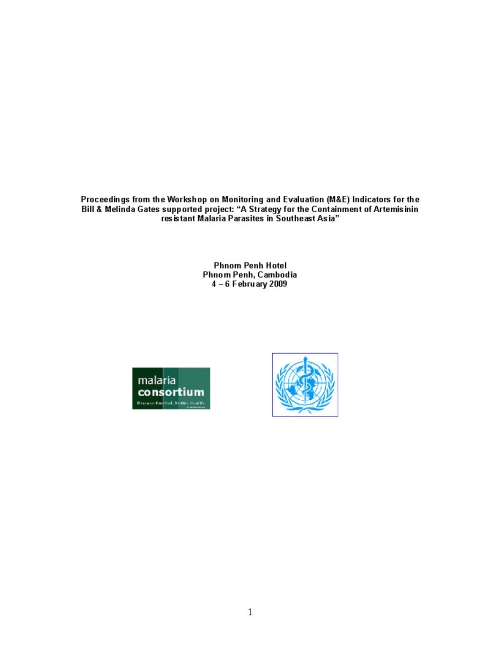
Publication Date:
04/02/2009
Type:
Project report

Proceedings from the workshop on monitoring and evaluation (M&E) indicators for the Bill & Melinda Gates supported project: “a strategy for the containment of artemisinin resistant malaria parasites in Southeast Asia
Publication Date:04/02/2009
Type:
Project report
Recent evidence from limited studies has suggested that artemisinin resistant Plasmodium falciparum parasites are present on the Thai-Cambodian border. The spread of artemisinin resistance, if confirmed, through Asia to Africa, would be a catastrophic setback to global efforts to control malaria. As an emergency project, the Bill and Melinda Gates Foundation is supporting the “Strategy to contain artemisinin resistant malaria parasites in Southeast Asia” through the World Health Organization (WHO), the National Malaria Control Programmes, and other relevant partners.
This meeting is the first of four technical meetings to be organized by Malaria Consortium, which will lead in collaboration with WHO the overall coordination of monitoring and evaluation activities, provide human resource support, engage in the support of operations research activities, and provide overall technical advisory support to the Project.
This inter-country workshop brought together programme staff from Cambodia’s National Malaria Programme (CNM) and Thailand’s Bureau of Vector-borne diseases (BVBD), including representatives from the University Research Co (URC), USAID, Pasteur Institute, and Mahidol University’s BIOPHICS Unit and Geographical Information Unit (GIU).
Country: Cambodia | Thailand
Keywords: Surveillance | Malaria | Elimination | Resistance management
Diseases: Malaria
« Back to Publications